16 Oct 14 | News and features, Politics and Society, Russia
Russia’s All-Russian Memorial Society faces closure after the Justice Ministry filed a suit with the country’s Supreme Court late last month.
The Justice Ministry filed its suit on 26 September, though Russian news outlets only publicised the case last week.
Recently, Memorial, a long-time critic of the Kremlin, has tried to gain more information on political prisons and has sought justice for victims of political persecution.
Russian prosecutors first sued for Memorial to register as a “foreign agent” under a law that targets groups that receive grants from abroad. However, the court struck down this request.
The Supreme Court will hold another hearing on 13 November, according to Radio Free Europe.
Updated 31 October. An earlier version of this article incorrectly reported that the International Memorial Society, an Index on Censorship award winner, was the subject of the Kremlin action.
This article was posted on 16 October 2014 and updated on 31 October 2014 at indexoncensorship.org
15 Oct 14 | Press Releases, Uncategorized
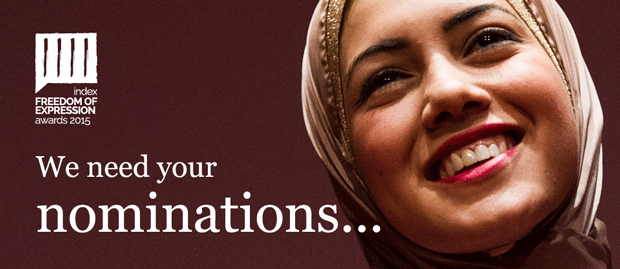
- Awards honour journalists, campaigners and artists fighting censorship globally
- Judges include journalist Mariane Pearl and human rights lawyer Sir Keir Starmer
- Nominate at www.indexoncensorship.org/nominations
Beginning today, nominations for the annual Index on Censorship Freedom of Expression Awards 2015 are open. Now in their 15th year, the awards have honoured some of the world’s most remarkable free expression heroes – from Israeli conductor Daniel Barenboim to Syrian cartoonist Ali Farzat to education activist Malala Yousafzai.
The awards shine a spotlight on individuals fighting to speak out in the most dangerous and difficult of conditions. As Idrak Abbasov, 2012 award winner, said: “In Azerbaijan, telling the truth can cost a journalist their life… For the sake of this right we accept that our lives are in danger, as are the lives of our families. But the goal is worth it, since the right to truth is worth more than a life without truth.” Pakistani internet rights campaigner Shahzad Ahmad, a 2014 award winner, said the awards “illustrate to our government and our fellow citizens that the world is watching”.
Index invites the public, NGOs, and media organisations to nominate anyone they believe deserves to be part of this impressive peer group: a hall of fame of those who are at the forefront of tackling censorship. There are four categories of award: Campaigner (sponsored by Doughty Street Chambers); Digital Activism (sponsored by Google); Journalism (sponsored by The Guardian), and the Arts. Nominations can be made online via http://www.indexoncensorship.org/newsite02may/nominations
Winners will be flown to London for the ceremony, which takes place at The Barbican on March 18 2015. In addition, to mark the 15th anniversary of the Freedom of Expression awards, Index is inaugurating an Awards Fellowship to extend the benefits of the award. The fellowship will be open to all winners and will offer training and support to amplify their work for free expression. Fellows will become part of a world-class network of campaigners, activists and artists sharing best practice on tackling censorship threats internationally.
Jodie Ginsberg, CEO of Index, said: “The Index Freedom of Expression Awards is a chance for those whom others try to silence to have their voices heard. I encourage everyone, no matter where they are in the world, to nominate a free expression hero.”
The 2015 awards shortlist will be announced on January 27th 2015. Judges include journalist Mariane Pearl and human rights lawyer Sir Keir Starmer. The public will be asked to participate in selecting the winner of the Google Digital Activism award through a public vote beginning January 27th 2015. Sir Keir said: “Freedom of expression is part of the bedrock of civilised, democratic society. The Index on Censorship Awards have a material influence on promoting such freedom and both celebrating and protecting those who fight against censorship worldwide. That’s why Doughty Street Chambers chooses Index as its principal charity.”
For more information please contact David Heinemann: [email protected]
_______________________________________________________________________
NOTES FOR EDITORS
About Index on Censorship:
Index on Censorship is an international organisation that promotes and defends the right to freedom of expression. The inspiration of poet Stephen Spender, Index was founded in 1972 to publish the untold stories of dissidents behind the Iron Curtain and beyond. Today, we fight for free speech around the world, challenging censorship whenever and wherever it occurs. Index believes that free expression is the foundation of a free society and endorses Article 19 of the Universal Declaration of Human Rights, which states: “Everyone has the right to freedom of opinion and expression.”
About The Index on Censorship Freedom of Expression Awards:
The Index Freedom of Expression Awards recognise those deemed to be making the greatest impact in tackling censorship in their chosen area.
Awards categories:
Journalism – for impactful, original, unwavering journalism across all media (sponsored by The Guardian).
Campaigner – for campaigners and activists who have fought censorship and who challenge political repression (sponsored by Doughty St Chambers).
Digital Activism – for innovative uses of new technology to circumvent censorship and foster debate (sponsored by Google).
Arts – for artists and producers whose work asserts artistic freedom and battles repression and injustice.
Previous award winners include:
Journalism: Azadliq (Azerbaijan), Kostas Vaxevanis (Greece), Idrak Abbasov (Azerbaijan), Ibrahim Eissa (Egypt), Radio La Voz (Peru), Sunday Leader (Sri Lanka), Arat Dink (Turkey), Kareen Amer (Egypt), Sihem Bensedrine (Tunisia), Sumi Khan (Bangladesh), Fergal Keane (Ireland), Anna Politkovskaya (Russia), Mashallah Shamsolvaezin (Iran)
Digital/New Media: Bassel Khartabil (Palestine/Syria), Freedom Fone (Zimbabwe), Nawaat (Tunisia), Twitter (USA), Psiphon (Canada), Centre4ConstitutionalRights (US), Wikileaks
Advocacy: Malala Yousafzai (Pakistan), Nabeel Rajab (Bahrain), Gao Zhisheng (China), Heather Brooke (UK), Malik Imtiaz Sarwar (Malaysia), U.Gambira (Burma), Siphiwe Hlope (Swaziland), Beatrice Mtetwa (Zimbabwe), Hashem Aghajari (Iran)
Arts: Zanele Muholi (South Africa), Ali Farzat (Syria), MF Husain (India), Yael Lerer/Andalus Publishing House (Israel), Sanar Yurdatapan (Turkey)
You have received this email because email address ‘[email protected]’ is subscribed to ‘AWARDS 2015 Call For Nominations’.
14 Oct 14 | Awards, News and features

(Photo: Alex Brenner / Index on Censorship)
Nominations for the annual Index on Censorship Freedom of Expression Awards 2015 are open. Now in their 15th year, the awards have honoured some of the world’s most remarkable free expression heroes – from Russian investigative journalist Anna Politkovskaya to education activist and 2014 Nobel Peace Prize winner Malala Yousafzai.
The awards shine a spotlight on individuals fighting to speak out in the most dangerous and difficult of conditions. As Idrak Abbasov, 2012 award winner, said: “In Azerbaijan, telling the truth can cost a journalist their life… For the sake of this right we accept that our lives are in danger, as are the lives of our families. But the goal is worth it, since the right to truth is worth more than a life without truth.” Pakistani internet rights campaigner Shahzad Ahmad, a 2014 award winner, said the awards “illustrate to our government and our fellow citizens that the world is watching”.
Index invites the public, NGOs, and media organisations to nominate anyone they believe deserves to be part of this impressive peer group. There are four categories of award: Campaigner (sponsored by Doughty Street Chambers); Digital Activism (sponsored by Google); Journalism (sponsored by The Guardian), and the Arts. Nominations can be made online and are open until November 20, 2014.
Jodie Ginsberg, CEO of Index, said: “The Index Freedom of Expression Awards is a chance for those whom others try to silence to have their voices heard. I encourage everyone, no matter where they are in the world, to nominate a free expression hero.”
Winners will be flown to London for the ceremony, which takes place at The Barbican on March 18 2015, and which will feature music and entertainment from across the globe.
In addition, to mark the 15th anniversary of the Freedom of Expression awards, Index is inaugurating an Awards Fellowship to extend the benefits of the award. The fellowship will be open to all winners and will offer training and support to amplify their work for free expression. Fellows will become part of a world-class network of campaigners, activists and artists sharing best practice on tackling censorship threats internationally. The fellowship will be launched formally later in the year.
Determination to tell the truth
Judges for this year’s Freedom of Expression awards include journalist Mariane Pearl and human rights lawyer Sir Keir Starmer. Sir Keir said: “Freedom of expression is part of the bedrock of civilised, democratic society. The Index on Censorship awards have a material influence on promoting such freedom and both celebrating and protecting those who fight against censorship worldwide. That’s why Doughty Street Chambers chooses Index as its principal charity.”
Alan Rusbridger, editor-in-chief, Guardian News & Media said: “We’re proud to once again be sponsoring the Journalism category of the Freedom of Expression Awards. Previous winners of this category have demonstrated dogged determination to tell the truth, and at a time when journalistic freedom is under pressure like never before, this category holds even greater significance.”
The Digital Activism Award will, for the second year running, be chosen by public vote. Google’s Head of Free Expression, Europe, William Echikson said: “Our support of the Index awards reflects our common concerns about the ongoing and increasing government crackdown against the free and open internet. When we first learned about the Digital Activism Award, we were immediately impressed with its motto, which celebrates the fundamental right to ‘write, blog, tweet, speak out, protest and create art and literature and music.’”
Index on Censorship is delighted also to have the continued support of academic and professional publishers, SAGE, for this year’s awards. Ziyad Marar, Global Publishing Director of SAGE, which sponsors the awards, said: “Through working with Index for many years both as publisher of the magazine and sponsors of the awards ceremony we are proud to support a truly outstanding organization as they defend free expression around the world.”
This article was posted on 14 Oct, 2014 at indexoncensorship.org
13 Oct 14 | Events

Index on Censorship visited the British Youth Council’s Convention for the north-east to hear what they thought about the key free speech issues of the moment.
The two groups looked at our Draw the Line question for the month “Should the police do more to protect free speech?” and quickly realised that there was a delicate balance between the need to keep the peace and the police’s over-involvement in what people can and cannot say or do. Here are some of the responses of the group:
13 Oct 14 | Events

For this month’s Draw the Line event, Index on Censorship held a workshop to discuss what role the police should play in encouraging or protecting freedom of expression. The debate kicked off asking if the police should have a role in protecting free speech at all. The group’s opinion varied with some thinking it was not in their remit while others thought that the police ultimately restricted free speech.
Morgan Meaker, a member of our Youth Advisory Board, then interviewed the schools officer for the London borough of Southwark on what his views were on the police’s role in protecting free speech. He suggested that it was not the responsibility of the police, but the people who make the laws which protect our human rights. When questioned about the police’s involvement in the recent arrests of several trolls on Twitter he said that if someone is breaking the law and threatening someone then the police have every right to arrest that person, but with online abuse the issues become more complicated.
This gave the group more to think about as they took on some real-world case examples and had to decide how they would respond if they were a police officer. One of the case studies covered online abuse and the other the role of police during protests. The groups carefully considered how they might handle these situations and concluded that while there were no clear cut answers that the police did have a role, but it was difficult as they couldn’t create the laws and could only enforce them.
13 Oct 14 | Azerbaijan, Azerbaijan News, Europe and Central Asia, News and features
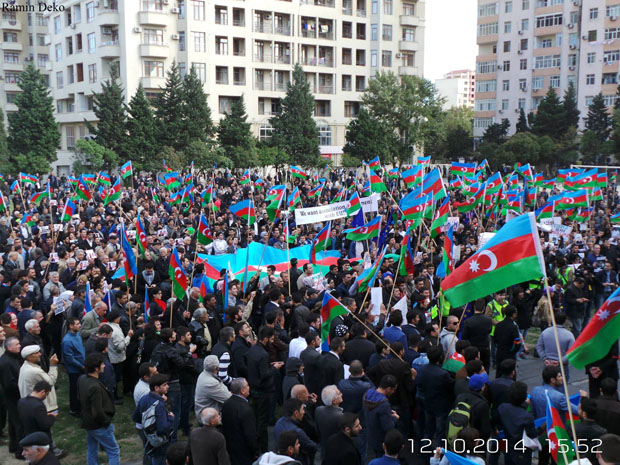
Thousands of Azerbaijanis took to the street on Sunday, calling for the resignation of President Ilham Aliyev, the release of political prisoners and an end to human rights abuses in the country. The protest comes during an ongoing and wide reaching crackdown on regime critics.
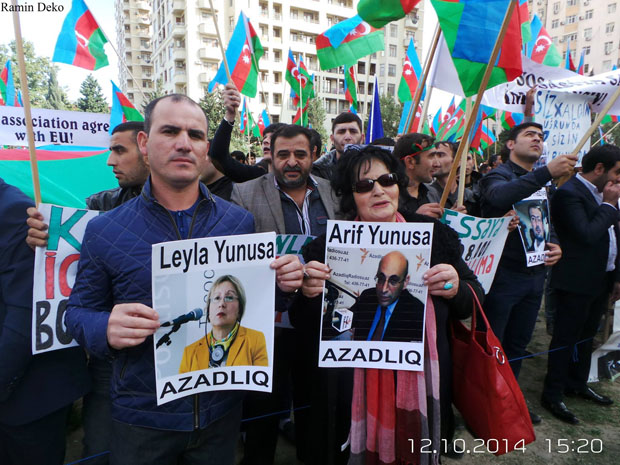
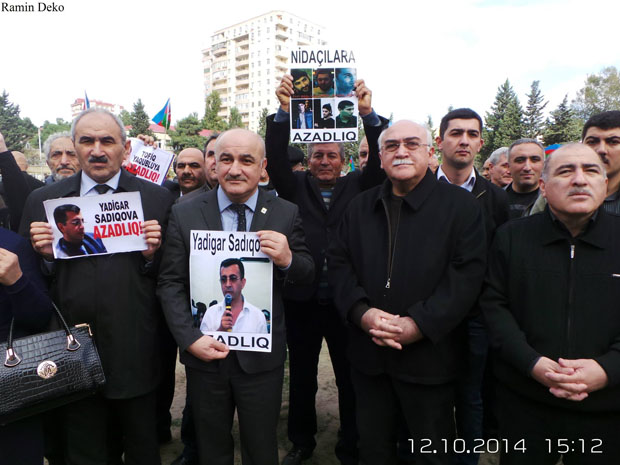
On Saturday, investigative journalist Khadija Ismayilova was placed under a travel ban. The award-winning reporter has covered corruption allegedly connected to Aliyev, and has been targeted by government supporters in the past. She is currently facing criminal charges of libel and document forgery, which she denies and vows to fight.
Last week, Index reported journalist Arzu Geybulla being threatened on social media and accused of treason after being interviewed by Azerbaijani news site Modern.az.
These cases follow the jailing of several prominent and critical voices within Azerbaijan’s civil society. Human rights defender Leyla Yunus and her husband Arif were detained in July, followed by fellow rights activist Rasul Jafarov, lawyer Intigam Aliyev and journalist Seymur Hezi.
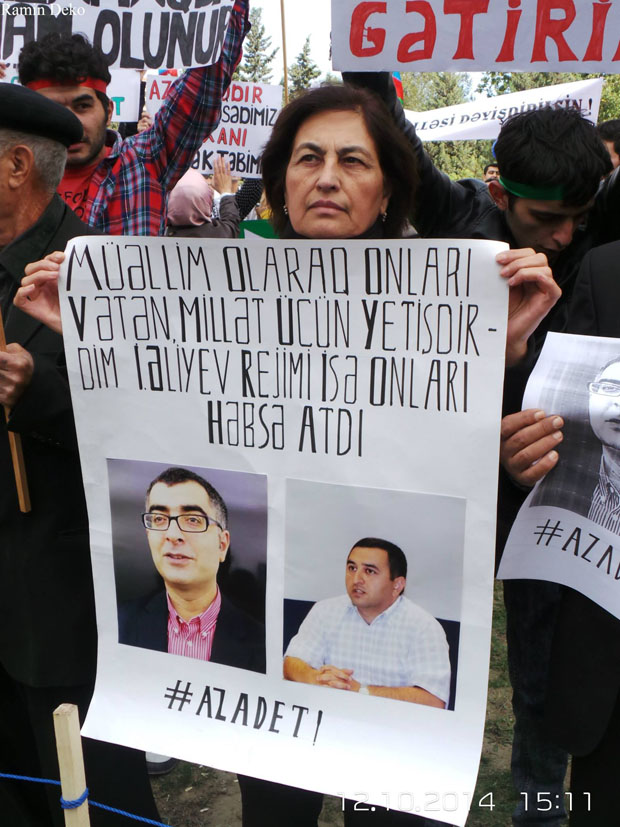
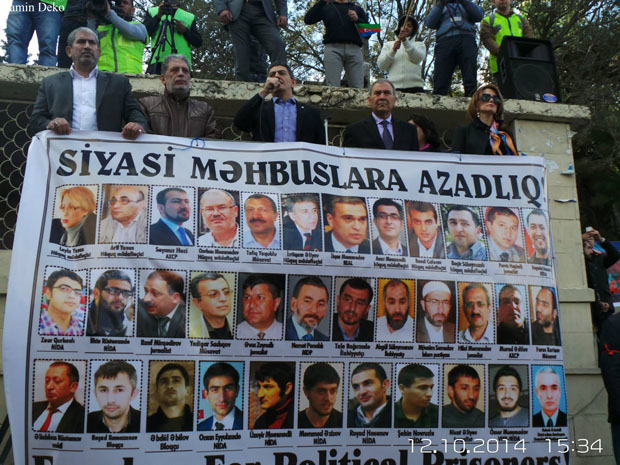
The European Parliament recently called on Azerbaijan — currently chairing the Council of Europe — to release several prominent political prisoners and proceed with reforming the country’s human rights policies. Before being arrested, Jafarov had worked on putting together a detailed list of the country’s political prisoners, with the latest figure coming to 98.
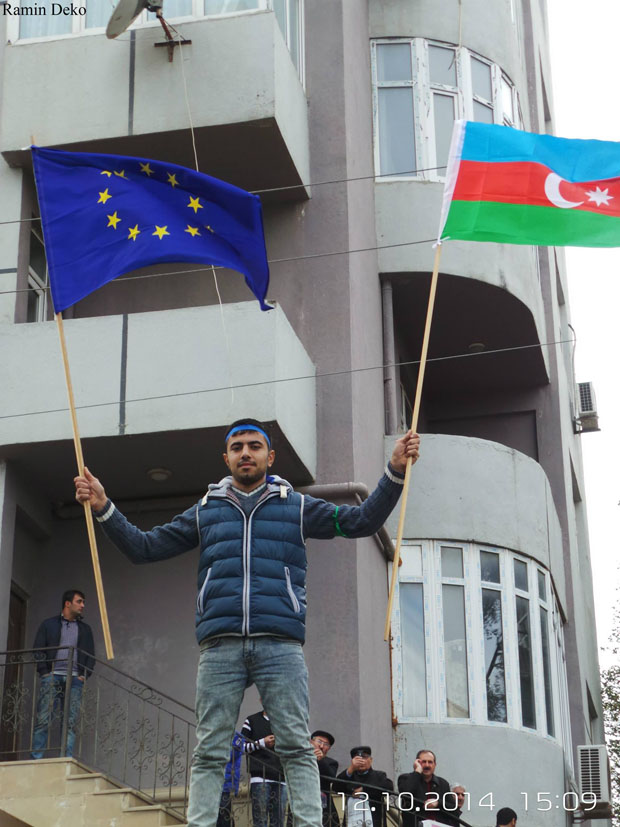
The protest, which also called for closer ties to the European Union, was approved by authorities, but took place in a remote part of Baku.
All photos by Ramin Deko
This article was posted on 10 October 2014 at indexoncensorship.org
10 Oct 14 | Azerbaijan, Azerbaijan News, News and features
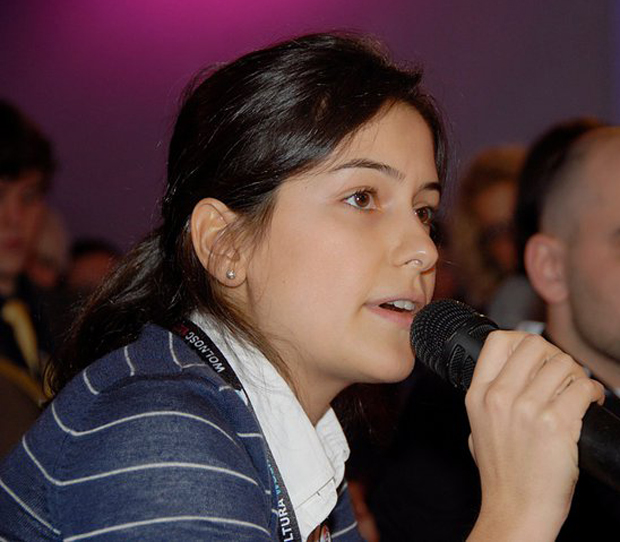
Arzu Geybulla
Journalist Arzu Geybulla has received a growing number of threats on social media following an interview with Azerbaijani news site modern.az.
Geybulla has been subject to ongoing intimidation because of her work at Istanbul-based Armenian paper, Agos. The interview has led to Geybulla being accused of treason by the Azerbaijani media.
Despite calls from the European Parliament in September, Azerbaijan has still failed to release prominent political prisoners Leyla and Arif Yunus, Rasul Jafarov, Intigam Aliyev and Hasan Huseynli.
Jodie Ginsberg, CEO of Index on Censorship, said: “Azerbaijan portrays itself internationally as a country that values human rights and respects the freedom of its citizens to express themselves. In reality, anyone who seeks to speak or act freely in Azerbaijan is targeted, imprisoned and harassed. The international community needs to take a far tougher stance on Azerbaijan to help defend individuals like Arzu and the defenceless individuals to which her work gives voice.”
Geybulla wrote for Index on Censorship about her thoughts on free expression in Azerbaijan on July 30, the day Leyla Yunus was detained.
Leyla and her husband have now been imprisoned for 73 days. Javarov has been in prison for 70 days since August 2, and Aliyev has been detained for 64 days, since August 8. Huseynli, who has been detained for 195 days since March 30, is serving a six year sentence.
Take action to support Arzu Geybulla, Leyla and Arif Yunus, Rasul Jafarov, Intigam Aliyev and Hasan Huseynli.
Post on Twitter, Facebook, Reddit or share with your friends. Let @PresidentAZ know you ware watching.
Please send appeals immediately:
— Condemning the campaign of intimidation directed at Arzu Geybullayeva for her legitimate work as a journalist at Agos;
— Calling on the Turkish and Azerbaijani authorities to investigate any threats of violence against her and to ensure her safety;
— Reminding them that they have the obligation to safeguard Geybullayeva’s right to freedom of expression under the European Convention on Human Rights (ECHR) and the International Covenant on Civil and Political Rights (ICCPR), to which they are both state parties.
Appeals to:
Mr Ramil Usubov
Minister of Internal Affairs for the Republic of Azerbaijan
7 Husu Haliyev Street
Baku, Azerbaijan
AZ1001
Email: [email protected]
Twitter: @PresidentAZ
Mr Efkan Ala
Minister of Interior for the Republic of Turkey
T.C. İçişleri Bakanlığı
Bakanlıklar
Ankara, Turkey
Email: [email protected]; [email protected]
Twitter: @efkanala
If possible, please copy appeals to the diplomatic representative for Azerbaijan and Turkey in your country. Let us know of any actions you have taken and responses you receive.
This article was posted on 10 October 2014 at indexoncensorship.org
10 Oct 14 | Draw the Line, Youth Board
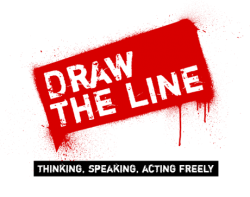
As protests continue to rock many countries, at times leading to use of excessive force including tear gas and rubber bullets by law enforcement officers against protesters, people have openly raised questions on police abuse. This month’s Draw the Line question focused on the excessive use of force during protests and the role police can play in striking the balance between keeping the peace and protecting free speech.
Being a witness to recent protests that turned ugly after use of batons, tear gas and rubber bullets against civilians protesting rigged elections in Pakistan, it was interesting to compare various responses on the #IndexDrawtheLine Twitter feed offered by participants from different parts of the world. An article shared by Fiona Bradley during the debate on Twitter discussed attempts made by Chinese authorities to censor use of police force against pro-democracy protesters in Hong Kong. The use of tear gas and counter protesters to disperse demonstrators has also changed the popular opinion regarding the city’s police that was once considered to be the best in region. On the other hand, an Amnesty International report revealed cases of excessive use of force by Brazil’s police throughout the protests that erupted before and during the Fifa World Cup this summer. This clearly depicts the extent to which police can be used by local authorites against civilians’ voicing their opinion publicly.
In an interview for the PBS Newshour, Margaret Huang, deputy executive director of campaigns and programs at Amnesty International’s US arm, raised an important point about the tactics deployed by the police in Ferguson, Missouri, during protests during there. “The police’s reaction might have been an overreaction. It may have actually been a violation of international standards for appropriate police response. If your purpose is to disperse people, tear gas is not a great tool for that,” Huang said. “It’s worth noting that tear gas is actually a weapon that’s not allowed to be used in warfare”, she said, “because it can be indiscriminate in who it targets. So the fact that police agencies in [the US] use it for crowd dispersal raises huge concerns about whether that’s a useful or appropriate response.”
Another important concern that has been raised is the increasing militarisation of police that is counter productive and looks more like an intimidating combat against foreign enemies in a war zone. In this case, should protesters have their own force to protect them in case the police start firing rubber bullets and tear gas on non-violent protesters or should there be appropriate training on dealing with such scenarios, keeping in mind the wide difference in domestic and military operations?
It is generally accepted that the state has an obligation to prevent injury and loss of life during public gatherings while maintaining public order to prevent social disruption and damage to property, according to the United Nations. Disgraceful police excesses will continue unabated during public gatherings unless authorities bring police tactics in line with basic human rights standards whether they belong to US, China or developing countries in south Asia and the Middle East.
A few participants from Pakistan offered the point that their country’s police cannot be trained on the lines of “protect and guard” instead of “us versus them” unless officials are appointed on merit without any political interference. But in the case of countries where political interference during recruitment isn’t the problem, one can not help but wonder about the steps required to make the police fall in line with defined international standards.
In the wake of G20 protests in London during the year 2009 that resulted in the death of news vendor Ian Thomilson, the Metropolitan Police came up with a 60 page report Adapt to Protest which advocated the need of major reforms required to deal with policing of protests. The report made a number of immediate recommendations that stressed facilitating peaceful protests, improving communication with the public/ protest groups through dialogue and moderating the impact of containment for proper access of food, water and other essentials. It acknowledged the dire need of giving importance to human rights during operational decisions and training that is needed to equip officers with tactics for effective policing and facilitating of protest activity. Such steps need to be introduced by law enforcement and then implemented independently which is not possible without the cooperation of political authorities and the public.
In this age of instant communication, people are bound to question images and videos of police abuse during mass protests accessible through internet and live television. The only way for police to strike the balance in maintaining peace and protecting civilians’ right to free speech and assembly is to start approaching it as a healthy expression of democracy instead of a menace that needs to be stifled and discouraged.
This article was published on 10 October 2014 at indexoncensorship.org
10 Oct 14 | Events, Press Releases
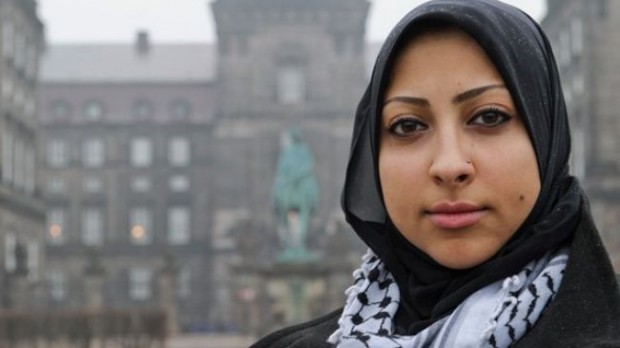
Bahrain human rights defender and 2012 Index Award Winner Nabeel Rajab is being detained and facing trial under arrest for peacefully expressing his views on Twitter.
Please join Index on Censorship and the Bahrain Institute for Rights and Democracy (BIRD) for a press conference with Bahraini activist and Co-Director of Gulf Centre for Human Rights Maryam Alkhawaja, who was released from prison three weeks ago, to discuss Nabeel Rajab’s detention and the recent developments in Bahrain.
WHEN: Wednesday October 15 at 11.00am
WHERE: Index on Censorship office: 92-94 Tooley Street, SE1 2TH, London.
For more information and to RSVP, please email [email protected] or call 0207 260 2660
Background for editors
Bahraini human rights defender Nabeel Rajab, President of the Bahrain Center for Human Rights and Director of the Gulf Center for Human Rights, is being charged for “insulting a public institution” over a tweet.
The arrest came less than 24 hours after Rajab returned to Bahrain from an advocacy trip where he spent over two months traveling throughout Europe to advocate for human rights in Bahrain. He also attended the UN 27th Human Rights Council Sessions to advocate for human rights in Bahrain and campaign for greater support to the Bahraini people’s struggle for rights and democracy.
Rajab was imprisoned in Bahrain for two years between July 2012 and May 2014 for exercising his right to freedom of assembly by participating in and calling for peaceful protests, in the capital city Manama, in defence of people’s rights. Before that he was prosecuted on multiple occasions for his tweets. Rajab has over 239,000 followers on twitter (@NabeelRajab) and his voice online is one of the most prominent in Bahrain, and across the Middle East. Following his release, Rajab continued to receive threats of repeated arrested, but was determined to continue with his peaceful human rights work.
Human rights activist Maryam Alkhawaja was released from prison in Bahrain in September but the charges against her still stand. Alkhawaja was arrested when she travelled to Bahrain to visit her father, prominent human rights defender and co-founder of the Bahrain Centre for Human Rights (BCHR), Abdulhadi Alkhawaja.
This will be her first UK press conference since her release.
10 Oct 14 | News and features
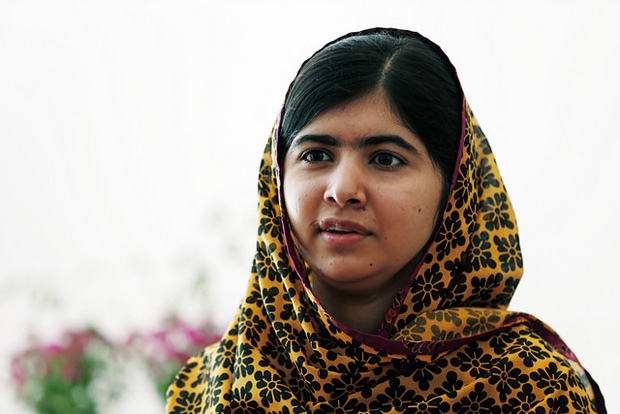
Malala Yousafzai Photo: (©Torbjørn Kjosvold/FMS/CreativeCommons/Flickr)
Pakistani education campaigner Malala Yousafzai has been awarded the 2014 Nobel Peace Prize. Yousafzai shares the award with Kailash Satyarthi, an Indian children’s rights activist.
Yousafzai was awarded the Doughty Street Chambers Advocacy award based on her work at the 2013 Index on Censorship Freedom of Expression Awards.
In October 2012, a Taliban gunman shot education campaigner Malala Yousafzai in the head and chest for her activism, as she was returning home from school in Pakistan’s Swat district. After months of treatment, she returned to school in Birmingham later that year.
The schoolgirl’s father, Ziauddin Yousafzai, accepted the award on his daughter’s behalf saying:‘I want to give a message to the world. I didn’t do anything special. As a father, I did one thing, I gave her the right of freedom of expression. All fathers and mothers, give your daughters and sons freedom of expression. Freedom of expression is a most important right. The solution of any conflict is to say the right thing, to speak the truth.’
At 17, Yousafzai is the youngest ever winner of the Nobel Prize. Fellow recipient, Kailash Satyarthi has lead various peaceful protests and demonstrations, focusing on the exploitation of children for financial gain. He formed the Bachpan Bachao Andolan, translated as, Save the Childhood Movement, which combats child labour.
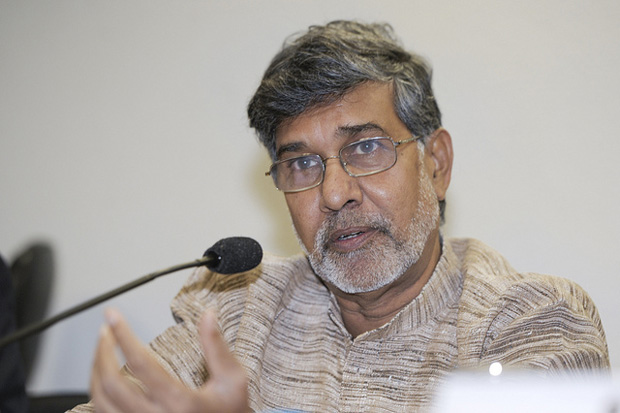
Kailash Satyarthi (Photo: ©José Cruz/Agência Senado/CreativeCommons/Flickr)
This article was posted on 10 Oct 2014 at indexoncensorship.org.
09 Oct 14 | Bahrain, News and features

Nabeel Rajab during a protest in London in September (Photo: Milana Knezevic)
Human rights activist Nabeel Rajab will stand trial on 19 October for allegedly insulting Bahraini government institutions on Twitter.
On 1 October, Rajab, president of the 2012 Index Freedom of Expression Award winner Bahrain Centre for Human Rights (BCHR) and director of the Gulf Centre for Human Right (GCHR), was summoned by the cyber crimes unit of the Criminal Investigation Directorate. He is alleged to have “denigrated government institutions” on Twitter, according to the Ministry of Interior. Rajab was released in May after two years in prison on charges including making offensive tweets and taking part in illegal protests.
The arrest came shortly after Rajab’s return to Bahrain following an international trip to raise awareness of human rights violations in his country. He was calling for the release of human rights activists — and father and daughter — Maryam and Abdulhadi Al-Khawaja. Maryam has since been released on bail, her travel ban lifted and trial postponed until 5 November. Abdulhadi continues to serve the life sentence handed down to him in 2011, after playing a prominent role in the country’s pro-democracy protests that year.
Rajab had been scheduled to appear before a judge Thursday afternoon to decide on whether to extend his 7-day pre-trial detention or to release him. But he was summoned to appear before the public prosecutor this morning.
A new complaint was lodged with prosecutors by the Ministry of Defence (MOD) in relation to the tweet. The MOD claims the tweet was insulting to the country’s security and military institutions. This morning’s interrogation lasted about 40 minutes, during which Rajab denied the charges and said that he was expressing his views on a public issue that is open for public debate, and it is his right of freedom of expression.
Rajab then met with his lawyer, who said she found out from Twitter that he had been referred to trial before the Lower Criminal Court – Chamber III on 19th October 2014. Rajab is now detained pending trial.
Rajab is now facing the charge of insulting/offending Public bodies based on the complaints filed by the Ministry of Interior and the Ministry of Defense. This crime is punishable by fine or by imprisonment which could reach up to 3 years based on the provisions of Article 216 read with Articles and 54 and 56 of the Penal Code which provide that:
Article 216: “A person shall be liable for imprisonment or payment of a fine if he offends by any method of expression the National Assembly, or other constitutional institutions, the army, law courts, authorities or government agencies.”
Article 54: “Imprisonment means the spending by a convicted person of the term of the prison sentence in one of the prisons facilities intended for this purpose in accordance with the Law. A prison sentences shall not be less than 10 days and shall not be more than 3 years unless the law otherwise provides.”
Article 56: “A penalty involving payment of a fine means obliging a convicted person to pay to the State the amount specified in the judgment. A minimum fine shall be BD1 and the maximum thereof, shall BD1,000 in case of felony and BD500, without prejudice to the limits prescribed by the Law for each offence. In determining the fine, a judge shall give regard to the financial condition of the convicted person. He shall be empowered to exceed the maximum by no more than double the amount if he deems fit.”
In September, Rajab spoke to Index about the human rights situation in Bahrain.
This article was posted on 9 Oct 2014 at indexoncensorship.org.
09 Oct 14 | News and features, Politics and Society, United Kingdom

It’s the newsagents I’ll miss the most. There are few more reassuring signs of civilisation than a well-stocked newsagent.
The tiny shop next to my local London underground station lays out a trestle table every morning, upon which sits a vast range of papers; the UK nationals, of course, and the local north London papers. And then Irish local and regional papers. The Kerryman, the Anglo-Celt, the Roscommon Herald, the Kilkenny People, the Kildare Nationalist, like Patrick Kavanagh’s barge “bringing from Athy/ And other far-flung towns mythologies.”
Newspapers are enthralling, odd things. The idea that every day a short novel’s worth of text is somehow corralled into print is strange and brilliant. And yet, gather more than two print journalists, even from still-profitable publications, in a room, and talk will soon turn to managed decline of the newspaper industry in Europe and the United States, and how the industry must be more like Buzzfeed, or less like Buzzfeed (it is mandatory to have an opinion on Buzzfeed).
This week, a group journalists gathered in the House of St Barnabas in London’s Soho, to discuss whether or not Britain gets the press it “deserves”. The panel, chaired by Miranda Sawyer of the Bug Consultancy, featured journalists Sophie Heawood and Matt Kelly, and media analyst Douglas McCabe. Heawood, who recently took up the dream gig of The Guardian newspaper’s weekend magazine main column, spoke interestingly about her path into broadsheet journalism via music writing (proving the truth in the advice given to all aspiring writers, Heawood spotted the gap in The Guardian’s coverage of the London grime music scene and inserted herself in it). Heawood, who gave up a column with Vice for her current Guardian slot, pointed out the irony that while we all seem to be grieving for newspapers, she still saw it as a move up in the world to go from new media to old.
McCabe pointed out that while we grieve, lots of people are still going out every day to buy a newspaper. Eventually they may not, but this decline may not happen as soon as we think.
The venue, a candlelit chapel, lent the night a funereal air. Certainly the short speech given by former Daily Mirror features editor Kelly felt a little like a eulogy. Kelly talked about his time as an indentured apprentice on a small Merseyside paper 25 years ago, earning £4,000 a year, of learning the ropes of court reporting, local government, all the dull but necessary things vital to local journalism. He moved to the Liverpool Echo and then the Daily Mirror, where he started on a salary of £42,000 in 1996 (a number that drew gasps from the young audience, which, one suspected, contained quite a few people who were in the apparently common position of being “full-time journalists” who don’t really get paid).
The Scouse journalist recalled glorious times of fully-staffed newsroom where “the budget” was only something politicians needed to manage. He claimed to have had no idea how much money he spent on journalism over the years, but he had spent thousands on keeping undercover reporter Ryan Parry in Buckingham Palace for two months in 2003, a story which sticks in the brain mainly because it’s when we first found out that the Queen keeps her cornflakes in Tupperware. The story was a success: Daily Mirror circulation spiked by 25% for three days after initial publication.
This, Kelly suggested, does not happen anymore: once your story goes out on the web, it’s everywhere. That bounce is lost. But that was not the real concern, he suggested: the real concern was that the route through journalism he took was dead as a model, that young reporters were not learning the basics, and that the metric-measuring web would always lead people to favour clickbait over difficult stories. So do we get the press we deserve? No, suggested Kelly. We get a significantly better press than we deserve. Analytics appeared to show that people only really wanted to read titillation, and for years journalists and editors had kidded themselves that people admired them for their hard-hitting journalism.
This led Kelly to his conclusion: the public doesn’t even deserve the British press. Hacks work hard on genuine stories, and the public doesn’t read them.
It’s a humbling, sobering thought for a trade not known for humility or sobriety. All that work and there you are, utterly unappreciated. Ask the average person not engaged in the media to name a great scoop. They will say Watergate. Ask them for another, and they might say MPs expenses. Ask what papers, or even what journalists were responsible for them, and the people who have seen All The President’s Men might be able to answer.
For most people, journalism and the media are kind of nebulous background noise. In the past, you had some kind of reason why you bought a particular newspaper, even if that reason was just that you always bought that newspaper. Increasingly though, people are barely aware of what publication they’re reading. Ask a recent graduate what site they read every day, or what their preferred news source is, and they will say be more likely to say Twitter than The Guardian. Which is why that publication and others are scrabbling to find new ways to bond with people beyond encouraging the reader going to a shop and buying a newspaper.
This fragmentation brings up the question of whether newspapers will maintain their influential position in society (be that good or bad) and if not, whether this will affect arguments for press freedom as distinguishable from everyday rights and liberties. We witness versions of this question from time to time: when local bloggers are excluded from council meetings because they are not accredited press, even if they are the only people in the area willing and able to cover the proceedings, for example. In the past, papers have been defensive of their position (many journalists can still get a scarcely believable amount of contempt into the word “blogger”) but in the post-Leveson world, in Life After Brian, it’s apparent that there is an interest in ensuring that press freedom and free speech are universal.
Explore the latest issue of Index on Censorship magazine for discussion on the Seeing the future of journalism: Will the public know more? In print, online or on your iPad.
This article was posted on 9 October 2014 at indexoncensorship.org


















